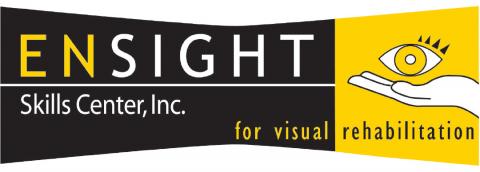
Struggling with vision loss?
Ensight Skills Center offers help, hope
by Julie Estlick
 When occupational therapist Denny Moyer noticed several of her older patients were injured in falls because of failing vision, she looked for local resources to help them. Finding none, Moyer — who has lived with a visual impairment since her late teens — worked to change that.
When occupational therapist Denny Moyer noticed several of her older patients were injured in falls because of failing vision, she looked for local resources to help them. Finding none, Moyer — who has lived with a visual impairment since her late teens — worked to change that.
She co-founded Ensight Skills Center in Fort Collins with a few others living with low vision, a loan from the Fort Collins Lions Club, and borrowed space at Elderhaus Adult Day Program. The Center provides education, training, tools, and support to help those ages 6 years and up live independently with low vision.
Center teams include occupational therapists, optometrists, and orientation and mobility specialists. Support groups and one-on-one peer support are also available to help clients adjust to vision loss. ]“When I was diagnosed with juvenile macular degeneration at age 19, I didn’t look for services — I was in denial for many years,” says Moyer, who serves as Ensight’s president and chief executive officer. “Later, working in occupational rehabilitation in Fort Collins I saw how many people were needing services and not getting them.”
 The need was even greater than she imagined.
The need was even greater than she imagined.
As the only nonprofit in Colorado providing comprehensive low-vision rehabilitation services, Ensight now has eight locations across the state. In the last year, they provided direct services to 370 residents in Fort Collins and 750 individuals statewide. Another 9,000 people across Colorado participated in outreach and education programs, learning about the impacts of low vision and the resources available. The program’s occupational therapists also travel to areas between centers to serve those who have difficulty with transportation.
Some of the main causes of low vision include macular degeneration, glaucoma, diabetes, brain injury, stroke, optic nerve damage, and cataracts. Colorado’s high elevation means UV exposure can be around 20 percent higher than at sea level, and not wearing adequate eye protection can lead to corneal damage, cancer of the eyelids, macular degeneration, and speed cataract development.
Most of Ensight’s clients are referred by their primary care doctor, ophthalmologist, or optometrist, but anyone can use the agency’s services.
Each client begins with a 90-minute low-vision evaluation with an optometrist and an occupational therapist, who look at the full range of visual acuity including what vision is remaining, where in the eye it is still working best, how glare impacts them, and how contrast might help to increase or decrease vision. Then different visual aid tools such as magnifiers and electronic equipment are introduced. Referrals may be made for a home visit by an occupational therapist, who looks at lighting and potential trip hazards, as well as safety in the kitchen and in the bathroom.
“The best place for training is often in the home,” Moyer explains. “We can see if the tools and techniques we’re teaching work for them in the place where they need to be successful, not just in our office.”
 Additionally, Ensight’s orientation and mobility specialists provide indoor and outdoor training to teach clients how to get around in their community and become oriented and safe in their environment. Mobility tools to consider include white canes, a seeing eye dog, and special GPS systems for the visually impaired that are more detailed and use verbal instructions.
Additionally, Ensight’s orientation and mobility specialists provide indoor and outdoor training to teach clients how to get around in their community and become oriented and safe in their environment. Mobility tools to consider include white canes, a seeing eye dog, and special GPS systems for the visually impaired that are more detailed and use verbal instructions.
“We can help people through the process of vision loss. We want them to know there is LOTS they can do to be independent, and there IS hope!”
For more information or to make an appointment, go to ensightskills.org or call 970-407-9999.